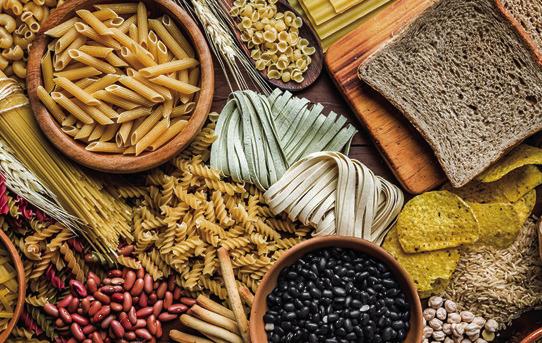The Case for Carbohydrates
A new study finds that we really do need carbohydrates. For years, carbs have taken a bad rap as the popularity of Atkins and keto diets soared. The truth is carbs aren’t bad: Complex carbs carbs with fiber -- are very much needed in a healthy diet pattern.
The study, published in the Journal of the Academy of Nutrition and Dietetics, looked at data on food and nutrient intake and markers of metabolic syndrome from respondents in the National Health and Nutrition Examination Survey (NHANES) 1999-2018. It included 19,078 respondents who were over 20 years old, had reliable and complete data on food and nutrient intake and markers of metabolic syndrome, and were not pregnant or breastfeeding.
Researchers, led by Dakota Dustin, a doctoral Student in the Department of Human Sciences at Ohio State University, found that carbohydrate intakes below recommendations (less than 45% of calories), with a high intake of fat, were associated with higher prevalence of metabolic syndrome.
Metabolic syndrome is characterized as having three of the following conditions: elevated waist?circumference, elevated triglycerides, reduced HDL (considered good cholesterol), elevated blood pressure or elevated plasma glucose.
Over one-third of adults in the U.S. have metabolic syndrome, and dietary carbohydrate intake may modify the likelihood of developing this condition. Researchers felt there is a lack of consistent evidence demonstrating the relationship between carbohydrate intake that falls below recommendations and metabolic syndrome.
Their findings showed those who had a carbohydrate intake below recommendations had 1.067 times greater odds of having metabolic syndrome compared to those who met carbohydrate recommendations. High intake of fat of any class was associated with higher odds of metabolic syndrome in those who had a carbohydrate intake below recommendations.
A healthy diet should consist of 45% to 55% carbohydrates, 20% to 35% fat and the remainder protein. Carbohydrates are present in fruits, vegetables, whole grains, dairy, nuts and seeds. The best-quality carbohydrates are those with fiber, considered complex carbohydrates.
The bottom line? We all need complex carbohydrates -- full of fiber -- in a healthy dietary pattern. Restricting or eliminating carbohydrates can lead to other health problems.
Q and A
Q: What is processed meat?
A: Processed meat is any meat that has been preserved by salting, curing, smoking, fermentation or dehydration. What all of these processes have in common is the use of nitrites, which block the growth of bacteria and prevent spoilage. The Dietary Guidelines recommend we limit intake of processed meats because eating even small amounts is associated with increased risk for colorectal cancer and cardiovascular disease. Examples of processed meats include bacon, chipped or corned beef, deli meats, ham, hot dogs, jerky, pancetta, pepperoni, prosciutto, salami, sausage and smoked meats.
RECIPE
Brussels sprouts are a great way to fight inflammation. This recipe pairs then with chicken thighs and roasts them in the oven. The recipe is from Cooking Light.
ROASTED CHICKEN THIGHS WITH BRUSSELS SPROUTS Servings: 4 1 tablespoon olive oil, divided 1 tablespoon minced garlic 2 teaspoons chopped fresh thyme, divided 1 teaspoon kosher salt, divided 1 teaspoon black pepper, divided 4 (6 ounce) bone-in, skin-on chicken thighs 1 lemon, cut into wedges 1/4 cup dry white wine 2 teaspoons butter 1/4 cup thinly sliced onion 1 pound Brussels sprouts, halved 1/3 cup lower-sodium, fatfree chicken broth Preheat oven to 425 degrees F. Combine 1 teaspoon oil, minced garlic, 1 teaspoon thyme, 1/2 teaspoon salt and 1/2 teaspoon pepper. Loosen skin on thighs by inserting fingers, gently pushing between skin and meat. Rub garlic mixture under loosened skin. Heat a large ovenproof skillet over medium-high. Add 1 teaspoon oil; swirl to coat. Add chicken thighs to pan, skin side down; cook 4 minutes. Turn thighs over; top with lemon wedges. Place pan in oven; bake for 18 minutes or until done. Remove chicken and lemon from pan; discard lemon. Discard drippings but do not wipe out pan. Return pan to mediumhigh. Add wine, cook 2 minutes, scraping pan to loosen browned bits. Remove pan from heat; add butter, swirling until butter melts. Heat a large skillet over mediumhigh. Add remaining 1 teaspoon oil; swirl to coat. Add onion; cook 1 minute, stirring constantly. Add remaining salt and pepper and Brussels sprouts; cook 8 minutes or until tender-crisp. Add broth to pan; cover and cook 2 minutes. Place chicken thighs on plates; serve with Brussels sprouts and sauce. Sprinkle evenly with remaining 1 teaspoon thyme. Serves 4 (serving size: 1 chicken thigh, 1 cup Brussels sprouts and 2 tablespoon sauce).
Per serving: 345 calories; 28 grams protein; 13 grams carbohydrates; 20 grams fat (6 grams saturated); 5 grams fiber; 3 grams sugars (0 grams added); 434 milligrams sodium.
Charlyn Fargo is a registered dietitian with SIU Med School in Springfield, Illinois. For comments or questions, contact her at charfarg@aol. com or follow her on Twitter @ NutritionRD. To find out more about Charlyn Fargo and read features by other Creators writers and cartoonists, visit the Creators website at www.creators.
com.

